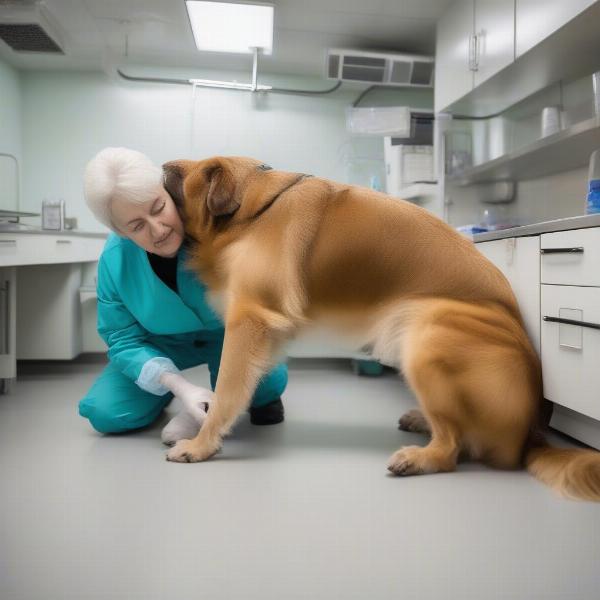Losing weight in an older dog can be concerning. While some weight fluctuation is normal, unexplained or significant weight loss can signal an underlying health issue. This article explores the common causes of weight loss in senior dogs, offers solutions, and guides you on when to seek veterinary attention.
 Veterinarian examining a senior dog for weight loss
Veterinarian examining a senior dog for weight loss
Understanding Weight Loss in Senior Dogs
As dogs age, their metabolism slows down, and they may naturally lose some muscle mass. However, rapid or excessive weight loss is often a symptom of a more serious problem. Identifying the underlying cause is crucial to addressing the issue effectively. It’s important to monitor your dog’s weight regularly and consult your vet if you notice any sudden changes. igp dog
Common Causes of Weight Loss
Several factors can contribute to weight loss in older dogs, including:
- Dental problems: Painful teeth or gums can make eating difficult, leading to decreased food intake and subsequent weight loss.
- Gastrointestinal issues: Conditions like inflammatory bowel disease (IBD), parasites, or pancreatitis can interfere with nutrient absorption, causing weight loss despite a normal appetite.
- Kidney disease: Kidney disease can lead to nausea, vomiting, and decreased appetite, all of which contribute to weight loss.
- Liver disease: Similar to kidney disease, liver problems can affect appetite and nutrient processing, leading to weight loss.
- Cancer: Various types of cancer can cause weight loss, often accompanied by other symptoms like lethargy, changes in bowel movements, or lumps and bumps.
- Diabetes: Dogs with diabetes have difficulty regulating blood sugar, which can lead to increased thirst, urination, and weight loss.
- Hyperthyroidism: An overactive thyroid gland can boost metabolism, leading to increased appetite but also weight loss due to the body’s inability to keep up with the accelerated metabolism.
- Cognitive dysfunction: Similar to Alzheimer’s in humans, cognitive dysfunction can affect a dog’s appetite and eating habits, causing weight loss.
What to Do if Your Older Dog is Losing Weight
If your senior dog is losing weight, the first step is to schedule a veterinary appointment. how to become a dog handler police Your vet will conduct a thorough physical exam, review your dog’s medical history, and may recommend further diagnostic tests such as blood work, urine analysis, or imaging studies to determine the underlying cause.
Supporting Your Senior Dog’s Nutritional Needs
Once a diagnosis is made, your veterinarian will recommend a specific treatment plan. In addition to medical interventions, dietary adjustments can play a vital role in helping your older dog regain and maintain a healthy weight.
- High-calorie, easily digestible food: Your vet may recommend switching to a senior-specific diet that is higher in calories and easier to digest.
- Smaller, more frequent meals: Feeding smaller meals more frequently can help improve digestion and encourage food intake.
- Appetite stimulants: In some cases, your vet may prescribe appetite stimulants to encourage your dog to eat more.
- Supplements: Adding supplements like omega-3 fatty acids or probiotics can support overall health and improve nutrient absorption.
When to Worry About Weight Loss in Your Older Dog
While some weight fluctuation is normal, you should consult your vet if your older dog experiences:
- Rapid weight loss: A loss of 10% or more of body weight within a short period is a serious concern.
- Loss of appetite: If your dog is consistently refusing food or showing disinterest in eating, it’s crucial to seek veterinary attention.
- Other accompanying symptoms: Weight loss combined with other symptoms like vomiting, diarrhea, lethargy, or changes in behavior warrants immediate veterinary care. dutch shepherd dog for sale
“Early intervention is key when it comes to weight loss in senior dogs,” says Dr. Emily Carter, DVM. “The sooner the underlying cause is identified and addressed, the better the prognosis for your furry friend.”
Conclusion
Weight loss in older dogs can be a sign of various underlying health conditions. Regular monitoring, prompt veterinary attention, and appropriate dietary adjustments are essential to maintaining your senior dog’s health and well-being. Don’t hesitate to contact your veterinarian if you notice any concerning changes in your dog’s weight or appetite. Addressing weight loss proactively can significantly improve your senior dog’s quality of life. k9 police dog commands
FAQ
-
How often should I weigh my older dog? Ideally, weigh your senior dog monthly to monitor any weight fluctuations.
-
Is weight loss always a sign of a serious illness? Not always, but significant or unexplained weight loss should be investigated by a veterinarian.
-
What are some easy-to-digest foods for older dogs? Cooked chicken, boiled rice, and sweet potatoes are generally well-tolerated by senior dogs.
-
Can stress cause weight loss in older dogs? Yes, stress can affect appetite and contribute to weight loss.
-
How can I encourage my older dog to eat? Try warming their food, offering smaller, more frequent meals, or adding a low-sodium broth to their food.
-
Are there any specific dog breeds prone to weight loss in their senior years? Certain breeds like German Shepherds and Greyhounds can be predisposed to weight loss as they age.
-
What if my older dog is losing weight despite eating normally? This could indicate a problem with nutrient absorption and warrants a veterinary visit.
ILM Dog is your trusted resource for all things dog-related. We provide expert advice and practical tips on dog breeds, health, training, nutrition, grooming, and more. Whether you’re a new dog owner or a seasoned expert, we’re here to support you every step of the way. We specialize in providing detailed information on dog breeds, offering guidance on selecting the right breed for your lifestyle, and addressing health concerns, such as weight management. Contact us today at [email protected] or +44 20-3965-8624. Visit ILM Dog for more information.